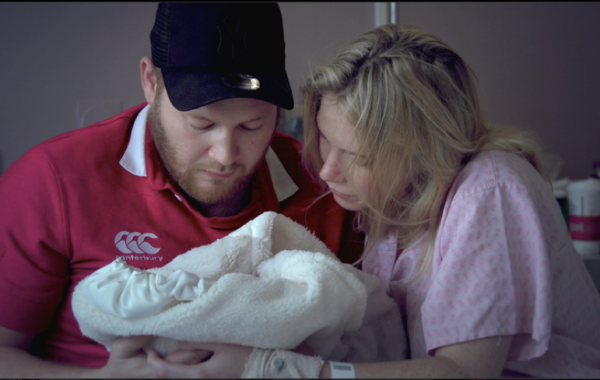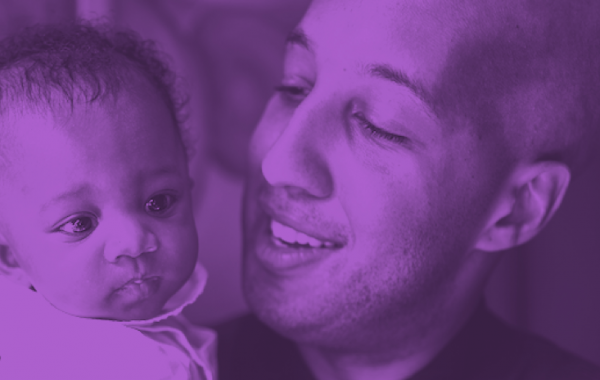85 Percent of Fathers Say They Would Do Anything to Be Very Involved In Caring for Their New Child, but Are Still Taking on Far Less than Mothers, Finds State of the World’s Fathers Report
Global report produced by gender equality organization Promundo, co-coordinator of MenCare: A Global Fatherhood Campaign, calls for accelerated action to close the care gap
“I believe there shouldn't be a distinction between which chores men can do and what women can do. For example, I can do the washing, cooking, and fetching of water and men can do the same.” —Woman, Ghana
June 5, 2019 – Vancouver, Canada: 50 minutes a day. That’s the amount of additional time men would need to contribute every day to caring for children and households to make a leap toward achieving gender equality in unpaid care, reveals the third-ever State of the World’s Fathers report, released today by Promundo, with Unilever Dove Men+Care at the Women Deliver 2019 Conference, in advance of Father’s Day in many countries around the world.
New research across seven countries (Argentina, Brazil, Canada, Japan, Netherlands, UK, and US) finds that 85 percent* of fathers say that they would be willing to do anything to be very involved in the early weeks and months of caring for their newly born or adopted child. So, what’s holding them back? The report identifies three major barriers: (1) the lack of adequate, paid paternity leave, and low take-up of leave when it is available; (2) restrictive gender norms that position care as women’s responsibility, alongside the perception of women as more competent caregivers than men; and (3) a lack of economic security and government support for all parents and caregivers.
The State of the World’s Fathers report is produced by Promundo, co-coordinator of MenCare: A Global Fatherhood Campaign, which is active in over 50 countries. It reveals new research findings, conducted with Unilever, Dove Men+Care in seven countries and Plan International Canada in four countries – drawing from interviews and surveys of nearly 12,000 individuals. It also includes cross- country data analysis from more than 30 countries, and it provides recommendations to close the unpaid care gap in support of achieving gender equality.
No country in the world has achieved equality in unpaid care work – or pay equality – between men and women. The progress is incredibly slow. Across 23 middle- and high-income countries, the unpaid care gap has closed by just seven minutes over the past several decades. Globally, women spend significantly more time than men – sometimes up to ten times as much – on unpaid care, volunteer, and domestic work (and spend more time on unpaid and paid work combined). Analysis of time use data finds that if men took on at least 50 minutes more care per day (and women did 50 minutes less), we would tip the scale toward equality.
One proven policy solution to support the redistribution of unpaid care work – equal, paid, nontransferable leave for all parents, including fathers – has yet to see universal uptake: Less than half (48 percent) of the world’s countries offer paid paternity leave, but when available, it is often less than three weeks – or sometimes only a few days.
Women want men to take paternity leave, and say it would improve their own health. Across the seven middle- and high-income countries surveyed, over 65 percent of women say mothers would have better physical health, and over 72 percent say they would have better mental health if fathers took at least two weeks paternity leave, reveals the report.
Even when paternity leave exists, State of the World’s Fathers finds that too few fathers take leave after the birth or adoption of a child. Less than half of fathers – across the same countries surveyed– took as much time as their country’s policy allowed. As many as 35 percent of fathers in Japan and40 percent of fathers in Canada report taking no time off at all after the birth or adoption of their most recent child.
Restrictive gender stereotypes are part of the problem. The report finds that significant proportions of men and women – from Promundo and partner-led surveys across every region in the world – agree that “changing diapers, giving baths to children, and feeding children should be the mother’s responsibility.”
In 23 of 32 countries where these data are available, the majority of men agree that “a man should have the final word about decisions in his home”; in 15 countries, at least 70 percent of men agree. In certain lower income countries and contexts, social stigma incurred by going against norms can be a deterrent: fathers in Bangladesh, Ghana, Haiti, and Nigeria reported they had experienced ridicule or been taunted by other men and community members when they started taking on more chores and work around the house.
There is also a perceived competence gap on parenting, and men rely more heavily on their female partners than vice versa: across Canada, Japan, Netherlands and UK, approximately twice as many fathers say they “rely on [their] spouse for knowledge and information on parenting” as compared to mothers. Fathers from Argentina to Brazil, Canada, the United Kingdom, and the United States believe that they are less competent at caregiving than their female partners.
Financial stress and insecurity also influence men’s caregiving: up to 76 percent of mothers (UK) and59 percent of fathers (Canada) from the seven middle- and high-income countries surveyed rate financial barriers as the main reason for not taking more parental leave. Context matters: economic insecurity, active conflict or war, and political instability present tremendous challenges for caregiving.
Governments and employers have a role in creating laws and policies that support all parents, caregivers, and families, in all their diversity, to thrive: from affordable childcare to living wages, social support to affordable education, and equal, fully paid, non-transferable parental leave. They also have a responsibility to set this crucial standard on care work, and to ensure that it is valued and shared equally. The report finds that certain countries like Sweden, Norway, Denmark, and El Salvador have set positive examples when it comes to supporting men’s caregiving and gender equality across norms and policies.
Reaching equality in unpaid care and domestic work is an urgent matter of gender justice and women’s rights. It is also a key factor in achieving the UN Sustainable Development Goal 5: Achieve gender equality and empower all women and girls. Having involved, caring fathers is good for gender equality and for women’s health. It can be linked with better relationships and a reduction in rates of men’s violence against women. It is good for children’s health and well-being, too. When fathers take on an equal share of the care work, it will accelerate progress for this generation and for the next, helping their children to support gender equality and break stereotypes.
“We must accelerate national commitments to support all children, parents, and families to thrive and to achieve men’s uptake of half of the daily care of children and of our homes. Full stop” says Gary Barker, President & CEO, Promundo.
“Anything less continues to perpetuate the inequalities that women and girls face every day.”The global report calls for countries, employers, and civil society to commit to accelerate action and support men’s increased participation in unpaid care work. By taking such action, the MenCare Commitment** aims to facilitate an enabling environment where men take on 50 percent of the unpaid care work by 2030. It also supports fathers to put their intentions to care into action by – at a minimum – taking on an additional 50 minutes a day. The MenCare Commitment is coordinated by Promundo, on behalf of MenCare: A Global Fatherhood Campaign. It is being driven with support from Women Deliver as part of the global advocacy organization’s ongoing efforts to champion gender equality and the health and rights of girls and women.
“There are significant inequalities in caregiving and women continue to shoulder a disproportionate share of unpaid care. As advocates, Women Deliver welcomes new evidence as a powerful tool for driving action and change,” said Susan Papp, Managing Director of Policy and Advocacy at Women Deliver. “The State of the World’s Fathers report arms us with the information we need to push for a more gender equal world.”Policy-makers and politicians, health workers and teachers, employers and media influencers, advocates and activists must all step up to end the inequality in unpaid care work. Only then can we build a more equal world. Note: The multi-country average reflects calculations that give equal weight to each respondent in each subcategory (i.e. men, women, fathers, mothers), regardless of country.
Read the full report: www.StateoftheWorldsFathers.org
For more information, visit www.men-care.org/MenCareCommitment
Join the conversation online: #WorldsFathers
Featured Work

Zak Ové
View Details
TIME’S UP UK
View Details
Channel 4
View Details



